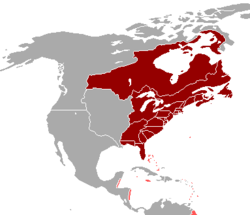
Back أمريكا البريطانية Arabic Britaniya Amerikası AZ Британска Америка Bulgarian Amèrica britànica Catalan Britská Amerika Czech British America German América británica Spanish آمریکای بریتانیا FA Brittiläinen Amerikka Finnish Amérique britannique French
British America[a] | |||||||||||||||||||||
|---|---|---|---|---|---|---|---|---|---|---|---|---|---|---|---|---|---|---|---|---|---|
| 1585–1783 | |||||||||||||||||||||
 British colonies in continental North America (red) and the island colonies of the British West Indies of the Caribbean Sea (pink), after the French and Indian War (1754–1763) and before the American Revolutionary War (1775–1783) | |||||||||||||||||||||
| Status | Colonies of England (1585–1707) Colonies of Scotland (1629–1632) Colonies of Great Britain (1707–1783) | ||||||||||||||||||||
| Religion | |||||||||||||||||||||
| Government | Monarchy with various colonial arrangements | ||||||||||||||||||||
| Monarch | |||||||||||||||||||||
• 1607–1625 (first) | James VI and I | ||||||||||||||||||||
• 1760–1783 (last) | George III | ||||||||||||||||||||
| History | |||||||||||||||||||||
| 1585 | |||||||||||||||||||||
| 1610 | |||||||||||||||||||||
• Bermuda | 1614 | ||||||||||||||||||||
| 1620 | |||||||||||||||||||||
| 1632 | |||||||||||||||||||||
| 1655 | |||||||||||||||||||||
| 1667 | |||||||||||||||||||||
| 1670 | |||||||||||||||||||||
| 1713 | |||||||||||||||||||||
| 1763 | |||||||||||||||||||||
| 1775–1783 | |||||||||||||||||||||
| 1783 | |||||||||||||||||||||
| Currency | Pound sterling, Spanish dollar, bills of credit, commodity money, and many local currencies | ||||||||||||||||||||
| |||||||||||||||||||||
British America collectively refers to various European colonies in the Americas prior to the conclusion of the American Revolutionary War in 1783. The British monarchy of the Kingdom of England and Kingdom of Scotland—later named the Kingdom of Great Britain, of the British Isles and Western Europe—governed many colonies in the Americas beginning in 1585. From 1607, numerous permanent settlements were made from Hudson Bay, to the Mississippi River and the Caribbean Sea.
Much of these territories were occupied by indigenous peoples, whose populations declined to epidemics, wars, and massacres. Britain and others shipped Africans in the Atlantic slave trade for labor to make the colonies successful. The British took Jamaica from Spain, entering the lucrative sugar islands and center of the slave trade. In 1664, England took the New Netherland colony in a war with the Dutch Republic. By the 1680s, frequent wars began between the British and the French over international power, trade, and colonies.
In Queen Anne's War (1702–1713), Britain won Newfoundland and the Hudson Bay area from New France. In the Seven Years' War (known in North America as French and Indian War (1754–1763)), the British won the eastern half of modern Canada, previously New France, and the Floridas from New Spain. In the American Revolutionary War (1775–1783), thirteen British colonies rebelled against the monarchy, forming the independent United States of America; Britain ceded the colonies and recognized the U.S. in the 1783 Treaty of Paris.
"British North America" refers to British possessions in continental North America afterwards, such as Lower Canada, but the term was only used after the 1839 Durham Report was published.
Cite error: There are <ref group=lower-alpha> tags or {{efn}} templates on this page, but the references will not show without a {{reflist|group=lower-alpha}} template or {{notelist}} template (see the help page).